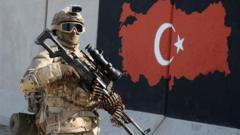The unexpected demise of Roman Starovoit just hours after his dismissal by President Putin has left Russia's political elite on edge. Once a high-ranking official, his potential involvement in a corruption scandal may have driven him to suicide, reflecting the perilous environment for government officials today.
A Grim Omen for Russia's Political Landscape

A Grim Omen for Russia's Political Landscape
The shocking death of former transport minister Roman Starovoit raises questions about the safety and stability of political figures in Russia.
In a startling turn of events this Monday, Russia witnessed a dramatic incident that has sent shockwaves through its political landscape. Hours after being dismissed from his position as transport minister by President Vladimir Putin, Roman Starovoit's lifeless body was discovered in a park on the outskirts of Moscow, reportedly with a gunshot wound to the head, along with a pistol found nearby. Preliminary investigations are suggesting the possibility of suicide.
The news of Starovoit’s death has provoked a wave of disbelief and speculation within Russian media. The tabloid Moskovsky Komsomolets characterized the situation as "almost unique" in contemporary Russian history, citing the rarity of a high-ranking government official committing suicide following a dismissal—a stark reminder of times before the dissolution of the Soviet Union, when similar incidents highlighted the deep fears within the political framework.
Kremlin spokesman Dmitry Peskov expressed the gravity of the situation during a conference call, admitting that the circumstances were shocking. While the investigation remains ongoing, the implications of Starovoit’s death raise unsettling questions regarding the climate of fear and repression within the Russian political elite.
Many analysts are drawing parallels to recent events in the Kursk region, where Starovoit previously served as governor before his brief tenure as transport minister. Under his leadership, significant funds were allocated for the construction of defensive fortifications along the Russian-Ukrainian border, which reportedly failed to withstand military incursions last year. This failure has prompted arrests of Starovoit’s former associates on fraud charges, suggesting that he could have become embroiled in legal troubles.
Experts speculate that if fears of impending prosecution drove Starovoit to take his own life, it reflects a grim reality for those in power. Professor Nina Khrushcheva from The New School in New York drew disturbing comparisons to the era of Stalin, noting that the rising atmosphere of repression has left some officials feeling trapped, with suicide becoming perceived as a viable escape.
Despite the severity of the situation, state-controlled media has downplayed Starovoit’s death. On the evening news, coverage was minimal and devoid of context regarding his dismissal or the tragic event that followed. Instead, the focus was shifted to the announcement of his successor, suggesting a deliberate intention to manage public perception.
The consequences of this incident extend beyond headlines; they send a stark warning to the current crop of officials in Russia. As Khrushcheva observed, the traditional paths of political advancement are now mired with risks that may culminate in life-threatening outcomes. The chilling message is clear: aligning oneself with today's Russian political establishment carries a perilous price.


















